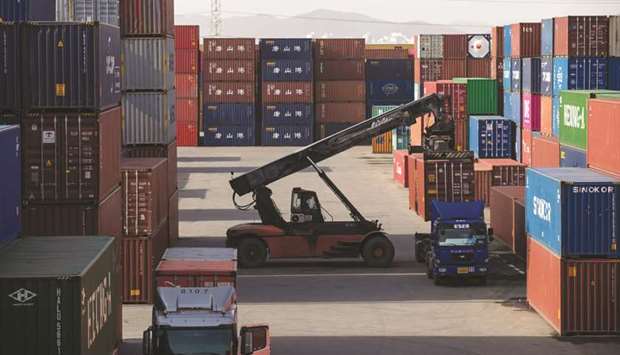The coronavirus crisis sent South Korean exports plunging in April at their sharpest pace since the global financial crisis, signalling a bleak outlook for international trade as the pandemic paralyses the world economy and shatters demand.
Exports dived 24.3% year-on-year in April, trade ministry data showed yesterday, the worst contraction since May 2009 but slightly slower than a 25.4% fall tipped in a Reuters survey.
It slid 0.7% in the previous month.
The average exports per working day, excluding the calendar effect, however, tumbled 17.4%, far worse than a 6.9% fall seen in March.
South Korea, Asia’s fourth-largest economy, is considered a bellwether for world trade and is the first among major exporting economies to release data on shipments. The grim numbers underline the sweeping impact of the pandemic and points to a rough period for international trade as factories struggle amid collapsing global demand.
On Thursday, factory surveys for China, the world’s biggest exporter, showed plummeting export orders.
“May will be extremely difficult for South Korea’s exports. We could potentially see the dip in shipments bottoming out in May should the US and Europe begin to normalise their economies,” said Park Sang-hyun, Chief Economist at Hi Investment & Securities.
“I cautiously expect exports to fall at a slower rate from June, especially on more stimulus from China and as oil prices recover, which should help boost Korea’s petrochemical products.”
A breakdown of the trade data showed overseas sales of the country’s top income earner semiconductors tumbled 14.9%, while those of oil products, car components and wireless devices plummeted 56.8%, 49.6% and 33.4%, respectively. By destination, shipments to the biggest trading partner China fell 17.9%, even as factories there resumed operations, while those to the United States and the European Union also slumped 13.5% and 12.8% each.
Imports dropped 15.9% in April, reversing a 0.3% gain in the previous month and pushing the trade balance into a $0.95bn deficit, its first trade gap since January 2012. More than 3.21mn people have been infected across the world, according to a Reuters tally, with nationwide infections in South Korea surpassing 10,700.
The virus pushed the South Korea’s economy into its biggest contraction since 2008 in the first quarter, while the business outlook slumped to the worst on record. Many expect the economy to shrink this year, with the International Monetary Fund (IMF) now seeing a 1.2% contraction. Hobbled by coronavirus, its two biggest trading partners, the United States and China saw their economies contract sharply in the first quarter, suggesting a painfully slow path to recovery for global trade. Months of pandemic lockdowns across the United States and Europe brought factories to a screeching halt, causing unprecedented disruptions for many Korean businesses including the nation’s global-trotting tech titans.
Samsung Electronics on Wednesday joined other tech giants such as SK Hynix in declining to provide annual forecasts because of uncertainty about the pandemic but said it expected profit to decline in the second quarter due to slumping sales of smartphones and TVs.

A reach stacker unloads a shipping container from a truck at the Uiwang Inland Container Depot. South Korea’s exports plunged 24.3% year-on-year in April, trade ministry data showed yesterday, the worst contraction since May 2009 but slightly slower than a 25.4% fall tipped in a Reuters survey.
